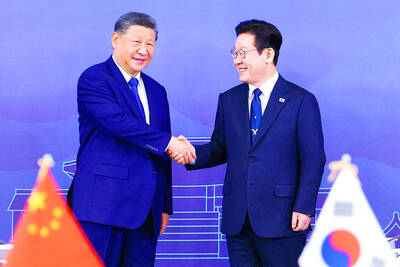Chinese authorities, seen as repressive toward Roman Catholics, are giving increasingly encouraging signals to the country's small Russian Orthodox community.
Orthodox followers in China hope they will soon be able to practice their faith normally after being forced into hibernation for many years, partly because of a lack of active priests.
The situation was due to be raised during Russian President Vladimir Putin's official visit to China last week, according to religious sources in Moscow, although this was not confirmed.
There are an estimated 10,000 to 12,000 Russian Orthodox Christians in China, either descendants of Russian immigrants or converted Chinese.
Most of them are in Inner Mongolia and around Urumqi, the capital of northwestern Xinjiang Province, although there are also a few hundred in Beijing, Shanghai, Tianjin and Harbin.
The Chinese Orthodox church reached its peak in the mid-1950s when it became autonomous and had two bishops who oversaw an estimated 20,000 faithful. However, the church was to suffer much at the hands of the Red Guard, which drove it underground in 1966.
The two bishops died in the 1960s and have never had any successors.
China's Orthodox community has since diminished, with many expecting it to disappear altogether after the death of the last active priest in December.
But, benefiting from the current healthy political climate between Moscow and Beijing, the Russian patriarchate has taken steps to revive the faith in the country.
The most important of these was the decision by Beijing to allow 18 Chinese students to undertake studies in seminaries of Moscow and Saint Petersburg.
"If they are allowed to fulfil their priesthoods in China by the Administration for Religious Affairs, one day they will become bishops and be able to ordain priests. Orthodoxy will thus return in China," said Russian businessman Dmitry Napara, who is delighted with the move.
Last June, China permitted an Orthodox monk from Alapayevsk, in Russia's Ural Mountains, to celebrate mass in northeastern Harbin, which is probably China's most Russian-influenced city.
The church has remained open in Harbin, where the faithful have had to make do with services held by laymen since the death of their priest more than four years ago.
In another gesture from Beijing, two Orthodox churches in Shanghai, one of which had been converted into a nightclub, will be returned to "more serious" use, according to Napara.
It was likely that one of them would be developed into an arts centre devoted to the history of the Russian presence in China, he says.
Napara also said the pragmatic Chinese may see the activities of the church in Harbin as an opportunity to attract tourists.

‘CHILD PORNOGRAPHY’: The doll on Shein’s Web site measure about 80cm in height, and it was holding a teddy bear in a photo published by a daily newspaper France’s anti-fraud unit on Saturday said it had reported Asian e-commerce giant Shein (希音) for selling what it described as “sex dolls with a childlike appearance.” The French Directorate General for Competition, Consumer Affairs and Fraud Control (DGCCRF) said in a statement that the “description and categorization” of the items on Shein’s Web site “make it difficult to doubt the child pornography nature of the content.” Shortly after the statement, Shein announced that the dolls in question had been withdrawn from its platform and that it had launched an internal inquiry. On its Web site, Le Parisien daily published a

China’s Shenzhou-20 crewed spacecraft has delayed its return mission to Earth after the vessel was possibly hit by tiny bits of space debris, the country’s human spaceflight agency said yesterday, an unusual situation that could disrupt the operation of the country’s space station Tiangong. An impact analysis and risk assessment are underway, the China Manned Space Agency (CMSA) said in a statement, without providing a new schedule for the return mission, which was originally set to land in northern China yesterday. The delay highlights the danger to space travel posed by increasing amounts of debris, such as discarded launch vehicles or vessel

RUBBER STAMP? The latest legislative session was the most productive in the number of bills passed, but critics attributed it to a lack of dissenting voices On their last day at work, Hong Kong’s lawmakers — the first batch chosen under Beijing’s mantra of “patriots administering Hong Kong” — posed for group pictures, celebrating a job well done after four years of opposition-free politics. However, despite their smiles, about one-third of the Legislative Council will not seek another term in next month’s election, with the self-described non-establishment figure Tik Chi-yuen (狄志遠) being among those bowing out. “It used to be that [the legislature] had the benefit of free expression... Now it is more uniform. There are multiple voices, but they are not diverse enough,” Tik said, comparing it

RELATIONS: Cultural spats, such as China’s claims over the origins of kimchi, have soured public opinion in South Korea against Beijing over the past few years Chinese President Xi Jinping (習近平) yesterday met South Korean counterpart Lee Jae-myung, after taking center stage at an Asian summit in the wake of US President Donald Trump’s departure. The talks on the sidelines of the APEC gathering came the final day of Xi’s first trip to South Korea in more than a decade, and a day after his meeting with the Canadian prime minister that was a reset of the nations’ damaged ties. Trump had flown to South Korea for the summit, but promptly jetted home on Thursday after sealing a trade war pause with Xi, with the two